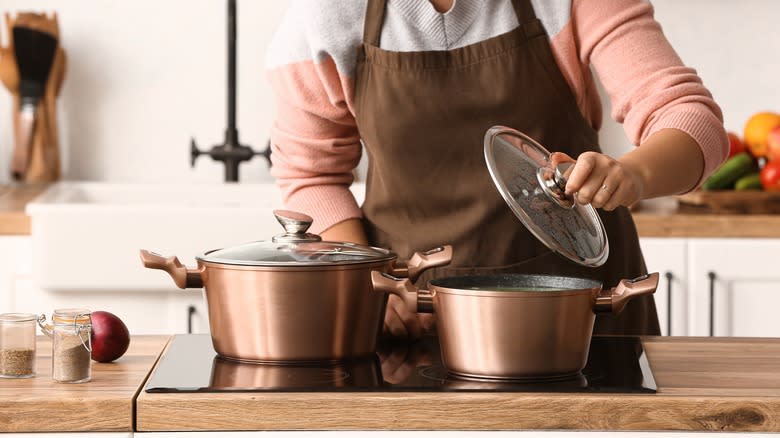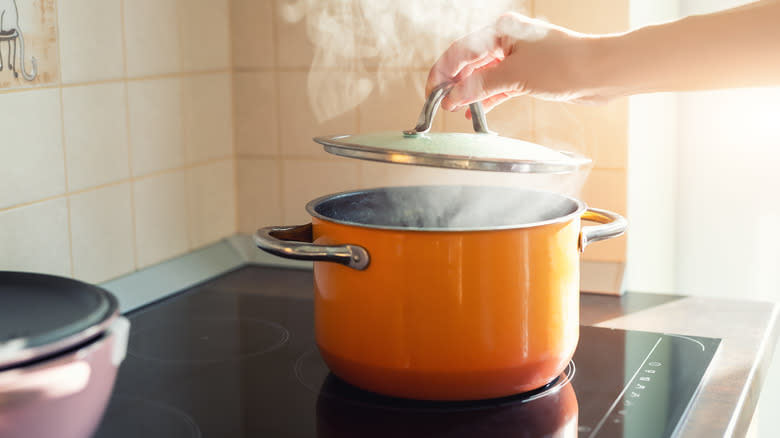You Accidentally Left Your Soup Out Overnight. Is It Still Safe To Eat?

Good intentions, when not enacted, often lead us astray. It's so easy to say, "I'll do the dishes after we watch the movie," or "The soup is way too hot right now. I'll put it in the fridge after it cools off; say, when I do the dishes" -- and the next morning, you awake to not only a sink full of dirty dishes, but also a soup pot still sitting on the stove, cold and forlorn. No judgment here! While dirty dishes will never clean themselves, you might be tempted to ask if that batch of sausage and spinach tortellini soup is still salvageable. Wouldn't it be a waste to toss out? Doesn't heating it back up to boiling kill any nasty bugs and make it safe to eat? The short answer is: No! Do you have a death wish? The long answer is ... technically yes, but gross (and, again, not something you should do).
The range of temperatures between 40 and 140 degrees Fahrenheit is what the USDA calls the "danger zone" of food storage. This is because when even cooked foods reach this temperature zone and stay there for more than two hours, they become a veritable petri dish for the growth of bacteria that can cause various food-borne illnesses with catchy names like Staphylococcus aureus, Salmonella, E. coli O157:H7, Campylobacter, and C. botulinum –- and that's far from a complete list.
Read more: The Best Way To Clean That Nasty Grease Off Of Your Kitchen Cabinets
Why You Don't Want Food Poisoning

Let's take each of those nasties in turn: According to the Minnesota Department of Health, S. aureus is typically associated with skin infections, but can also cause pneumonia. Johns Hopkins Medicine warns that contracting salmonella can result in a three-day hellscape of diarrhea, vomiting, fever, chills, and headaches. The symptoms of E. coli are similar to those caused by salmonella, but potentially fatal, as noted by the Centers for Disease Control and Prevention. Also per the CDC, campylobacter might at first present like regular food poisoning, but can sometimes result in complications like arthritis or irritable bowel syndrome. Among many other awful symptoms, botulism can straight-up cause paralysis, according to the Mayo Clinic.
So, yeah: Toss that soup that sat out overnight. Now, to the question of whether or not boiling it will kill off these bugs -- that might be technically true, but it comes with a big caveat. To be completely safe, you'll have to boil the soup vigorously for 10 minutes. Doing this will not only kill off any active bacteria, it will also inactivate -- but not destroy -- botulinum spores. Boiling chicken stock for 10 minutes is one thing, but is there any actual soup recipe that wouldn't be rendered inedible by a 10-minute boil? Try that with your creamy salmon and scallop chowder. You might as well put it in the blender.
Spores The Merrier

The reason you'd have to boil your soup so long is solely to inactivate botulism toxin spores, because one minute of boiling is sufficient to kill off active bacteria. But botulism spores things are nasty -- they start germinating below 130 degrees Fahrenheit, and by the time your soup got to body temperature, they were doubling their number every 15 minutes; at room temperature, they double every hour and a half. This is not something you want to mess with.
Obviously, food poisoning is awful and something to be avoided, but you don't have to store your cooked food safely solely out of fear. The best soups are those which are cooked to perfection and stored in as pristine a state as possible; the cleanest stocks are the ones that are strained and chilled as soon as they're cool enough to handle. Sometimes the wisest thing a cook can do is throw out something they've labored over, lest it bring harm instead of nourishment.
Read the original article on Daily Meal.

 Yahoo Finance
Yahoo Finance 